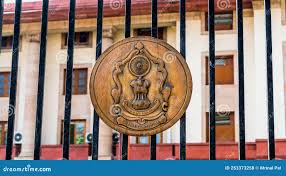Hello Home Educational Society[The Society] desired to establish a new Junior High School (Class I to Class VIII) in Jasola area, New Delhi. For the said purpose, the Society was required to obtain an Essentiality Certificate, Sponsorship Letter and also the necessary recommendation from the appropriate authority. On 27.12.2000, an Essentiality Certificate was issued by the Deputy Director of Education. Thereafter, on 08.01.2002, Sponsorship Letter was issued by the Estate Branch, Lucknow Road, Delhi for setting up the Middle School in Jasola, District South Zone. It is after the fulfilment of these two conditions that the Land Allotment Committee recommends for allotment of the land. (Para 2)
The IAC made recommendation for allotment of land to the Society in Vasant Kunj vide letter dated 23.01.2004. It appears that this letter recommending allotment of land in Vasant Kunj was issued under some mis-conception. The Sponsorship Letter and Essentiality Certificate had been issued for Jasola area only and there was no Essentiality Certificate or Sponsorship Letter for Vasant Kunj area. Vasant Kunj area was in Zone 20, whereas Jasola in Zone 25 at the relevant time and now it is in Zone 29. (Para 5)
A complaint was made by one Mr. Sukhbir Singh, who was a resident of Vasant Kunj on 21.02.2003, stating that the Society was trying to illegally get an allotment in Vasant Kunj area for establishing a school whereas the sponsorship letter was issued by the Directorate of Education for Jasola area. Despite the said objection, being on record and also the fact that the Society was not entitled to any allotment in any area other than for which the Essentiality Certificate and Sponsorship Letter had been issued, the file for allotment of land measuring 0.54 hectares in Pocket 6 & 7, Sector-B, Vasant Kunj was prepared and submitted for approval. The said file was also placed before the Lieutenant Governor who had in turn granted the in-principle approval for the same on 24.03.2003. (Para 6)
The Society, in the meantime, approached the High Court of Delhi by way of W.P.(Civil) No.4459 of 2014 on 19.07.2014 praying for a writ of Mandamus directing the respondent therein to implement the decision already taken for allotment of institutional plot to the appellant in view of the approval granted for Vasant Kunj area. Parity was also claimed with one Jyotika Education Society decided by the Delhi High Court in L.P.A. No.1670-71 of 2006. Relief claimed in the writ petition is reproduced hereunder (Para 11)
The appellant was aggrieved by the judgment of the learned Single Judge as, according to it, the judgment was both factually and legally incorrect and as such unsustainable. It preferred an intra-Court appeal before the Division Bench which was registered as L.P.A. No.224 of 2019. The Division Bench, by the impugned order dated 12.11.2021, dismissed the appeal on the reasoning that change of policy from allotment to auction could not have any retrospective effect, and therefore, the rejection of allotment was illegal. The appellant filed a Review Petition before the Division Bench registered as R.P.No.15 of 2022, which was disposed of, vide order dated 22.02.2022 without interfering with the main order, except for a clarification. It is against these two orders that the present appeals have been filed. (Para 13)
Whether the change in policy was retrospective or not is not an issue here. The change in policy decision taken on 15.12.2003 clearly mentions that even pending allotment matters were to be dealt with according to said change i.e. of holding auctions. This decision of change in policy brought about on 15.12.2003 was never challenged as is apparent from the relief claimed in the petition. Therefore, the settled procedure to be followed on or after 15.12.2003 was only to provide land by way of auction of educational sites and not by way of any allotment. Before that date there was no allotment of land in favour of the respondent. Even otherwise it is the settled position of law that whenever the State intends to transfer any land resort should be by public auction or inviting tenders. (Para 18.9)
Another argument raised by Dr. Singhvi regarding allotment having been made in favour of other Societies is also of no help. In the present case, the Society did not have the necessary Sponsorship Letter for establishing the school in Vasant Kunj area, and therefore, it was not even eligible to apply for procuring a site in Vasant Kunj area under the original rules. Further it is well settled that if any allotment had been made contrary to the existing policy and rules, the same would not form a basis of benefit being extended to another society as under law negative parity is not recognised or approved rather it is disapproved. (Para 18.10)
For the reasons recorded above, we are convinced that the only outcome of the writ petition was dismissal. The Single Judge and Division Bench fell in serious error while granting relief to the respondent Society. Accordingly, the appeals are allowed, the impugned orders passed by the Division Bench and Single Judge are set aside. The writ petition is dismissed. (Para 19)
SUPREME COURT OF INDIA
2024 STPL(Web) 33 SC
2024 INSC 33
Delhi Development Authority Vs. Hello Home Education Society
Civil Appeal Nos. 3659-3660 of 2023-Decided on 11-01-2024
https://stpllaw.in/wp-content/uploads/2024/01/2024-STPLWeb-33-SC.pdf







